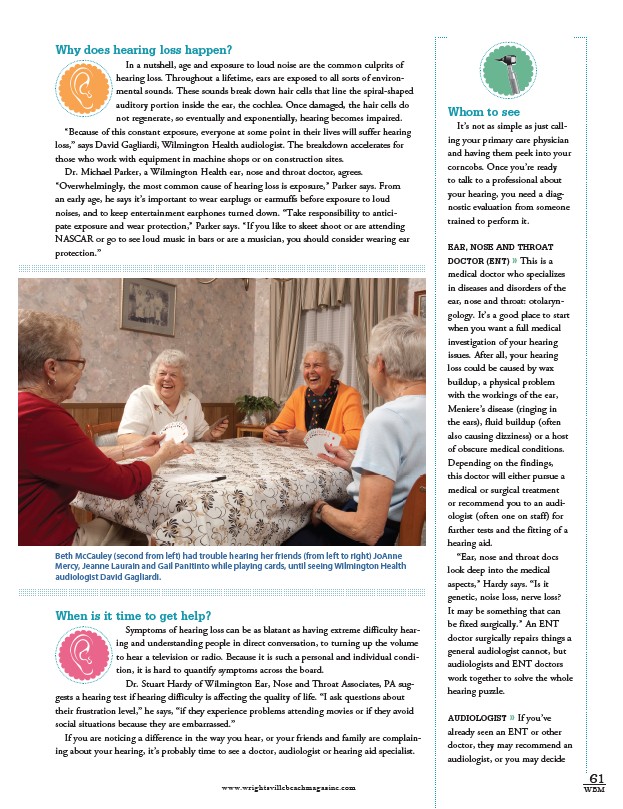
61
Whom to see
It’s not as simple as just calling
your primary care physician
and having them peek into your
corncobs. Once you’re ready
to talk to a professional about
your hearing, you need a diagnostic
evaluation from someone
trained to perform it.
Ear, nose and throat
doctor (ENT) » This is a
medical doctor who specializes
in diseases and disorders of the
ear, nose and throat: otolaryngology.
It’s a good place to start
when you want a full medical
investigation of your hearing
issues. After all, your hearing
loss could be caused by wax
buildup, a physical problem
with the workings of the ear,
Meniere’s disease (ringing in
the ears), fluid buildup (often
also causing dizziness) or a host
of obscure medical conditions.
Depending on the findings,
this doctor will either pursue a
medical or surgical treatment
or recommend you to an audiologist
(often one on staff) for
further tests and the fitting of a
hearing aid.
“Ear, nose and throat docs
look deep into the medical
aspects,” Hardy says. “Is it
genetic, noise loss, nerve loss?
It may be something that can
be fixed surgically.” An ENT
doctor surgically repairs things a
general audiologist cannot, but
audiologists and ENT doctors
work together to solve the whole
hearing puzzle.
Audiologist » If you’ve
already seen an ENT or other
doctor, they may recommend an
audiologist, or you may decide
Why does hearing loss happen?
In a nutshell, age and exposure to loud noise are the common culprits of
hearing loss. Throughout a lifetime, ears are exposed to all sorts of environmental
sounds. These sounds break down hair cells that line the spiral-shaped
auditory portion inside the ear, the cochlea. Once damaged, the hair cells do
not regenerate, so eventually and exponentially, hearing becomes impaired.
“Because of this constant exposure, everyone at some point in their lives will suffer hearing
loss,” says David Gagliardi, Wilmington Health audiologist. The breakdown accelerates for
those who work with equipment in machine shops or on construction sites.
Dr. Michael Parker, a Wilmington Health ear, nose and throat doctor, agrees.
“Overwhelmingly, the most common cause of hearing loss is exposure,” Parker says. From
an early age, he says it’s important to wear earplugs or earmuffs before exposure to loud
noises, and to keep entertainment earphones turned down. “Take responsibility to anticipate
exposure and wear protection,” Parker says. “If you like to skeet shoot or are attending
NASCAR or go to see loud music in bars or are a musician, you should consider wearing ear
protection.”
Beth McCauley (second from left) had trouble hearing her friends (from left to right) JoAnne
Mercy, Jeanne Laurain and Gail Panitinto while playing cards, until seeing Wilmington Health
audiologist David Gagliardi.
www.wrightsvillebeachmagazine.com WBM
When is it time to get help?
Symptoms of hearing loss can be as blatant as having extreme difficulty hearing
and understanding people in direct conversation, to turning up the volume
to hear a television or radio. Because it is such a personal and individual condition,
it is hard to quantify symptoms across the board.
Dr. Stuart Hardy of Wilmington Ear, Nose and Throat Associates, PA suggests
a hearing test if hearing difficulty is affecting the quality of life. “I ask questions about
their frustration level,” he says, “if they experience problems attending movies or if they avoid
social situations because they are embarrassed.”
If you are noticing a difference in the way you hear, or your friends and family are complaining
about your hearing, it’s probably time to see a doctor, audiologist or hearing aid specialist.